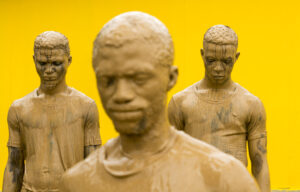
“Lagos is the quintessential entrepreneurial African city, with its international connections, a diverse culture and so much simultaneously happening. Art season 2019 was pivotal, a lot of international visitors realized that something exciting was going on. Further professionalization of the sector would mean artists connecting with arts administrators and managers, that would allow them to focus on creating art, with Nigeria becoming a globally acknowledged standard”.
Joyce Pennekamp interviewed local professionals on the art scene in Lagos.
Akudaaya, a performance by Yusuf Durodola with the participants of Communal Re-Imagination, an Alternative Art School programme in Iwaya Community. Photo by VAL Workstation, 2018
Meanwhile in Lagos
I still remember my last stay in Lagos during art season, November 2019, very well. The lockdown fades memory, blurring 2020 into a haze, but sharpens pre-Covid-memories. Abrupt events affect your brain. New memories could not be made, as all travelling was blocked. What is happening in Lagos now? As we live our separated digital realities, I asked 4 multitasking art professionals to share their experiences: Oyindamola Fakeye, Jumoke Sanwo, Aderemi Adegbite and Abdulrazaq Awofeso.
2019 Memories
Mainland and Island: during art season Lagos is shimmering and shivering, the excitement is tangible. While trying (i.e.: being privileged) to get around in Uber, you can tell where the action’s at. The traffic is consuming half of your stay, but no worries: it is safe and the drivers are excellent curators in their local music, providing you with the latest Naija sound. Lagos is definitely a sonic experience, including the 24/7 Kutian claxofonia.
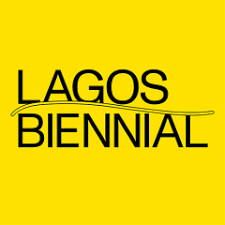
The art fair ART X Lagos is already legendary in its 5 year existence. The entrance alone makes your stay worthwhile: posing visitors, dressed in bright coloured African Fashion, expressing proud allure. So yes, my memories are sharp. Art X, Lagos Biennial, Lagos Photo, the excellent galleries: all Must See’s if you want to be up-dated on African contemporary art. Common knowledge, but it cannot be stressed enough: art production has always been present, but these events contribute to the professionalization of the art scene and enlarge its visibility. During one of the seminars at Art X a tribute was given to late Olabisi Silva, art historian, curator, founder of CCA Lagos and undoubtedly of inspiring and initiating importance in the careers of many -young- African artists and curators, establishing an art structure that got international attention. The tribute displayed the much appreciated and needed space given to the development of artistic talent.
Of course. It is not all that glitters is gold. While Ubering around, the complexity and poverty in the city is equally overwhelming. The struggle for education, recognition, opportunities, and the impossibility to make a living as an artist are evident. Local and international visibility is still for the happy few.
2020 realities
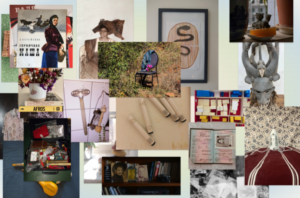
Lagos Festival, HOME Museum
Then Covid-19 happened. Lagos was in a severe lockdown for four months and this paralyzed the city. Art events were cancelled, though Lagos Photo created the online HOME MUSEUM, radically deviating from curatorial practice and limitations of space and time. Worldwide, people united to stand up against excluding systems and in Nigeria the #EndSARS movement united young people, artists included, to revolt against state police oppression and violence. ART X Lagos showed solidarity and decided to organize online seminars and exhibitions around the activist movement. An opposite perspective from the festive vibe during art season, but democratizing accessibility. No need for Uber. Against all, or as Oyinda Fakeye puts it: because of these odds, artists manage to “move” as Abdulrazaq Awofeso states. Even pre-Covid it was hard to keep up with the activities of the four art professionals, in 2020 they experienced the lockdown in different but amazingly productive ways.
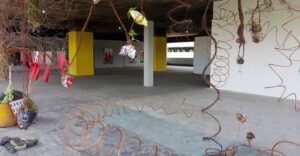
Lagos-Biennial 2019, Overview: Rahima Gambo, A walk sculpture and Raul Jorge Gourgel Sandra Poulson, Plastic Broken Chairs Juxtaposed
Aderemi Adegbite is an artist-curator and founder of Iwaya Community Art Festival (ICAF) and community centre Vernacular -Art space Laboratory (VAL). Iwaya is the neighbouring community of better known Makoko, Nigeria’s “Venice”, both the poorest areas of Lagos. When I first visited his centre in 2018, I was prepared, but still shocked by the reality of the immense poverty. As a Lagosian, Aderemi knows his home quarters inside and out, so he smoothly guided me to VAL, at the bank of Lagos Lagoon, magically overlooking the third mainland bridge. He offers his visitors rubber boots to steadily cross through wood boards in the polluted delta area.
Being a firm believer of the importance of connecting art and community, Aderemi yearly organizes the artist-run community-based ICAF. Selected artists-in-residency create new work, while getting to know the community and Lagos art scene. His dream was a space to enable youngsters to be educated in art and become of value for their community. This came true in 2018, when he was granted a Prince Claus Relief Fund. Building and managing the centre implied many tough challenges, as the community wanted to be -mostly financially- convinced of the usefulness of the successfully operating VAL centre. This success faded in lockdown, the centre closed and just recently Aderemi opened Postcripts, a restart exhibition of local artists on the impact of Covid-19, with a Prince Claus’ Next Generation relief fund.
Like all artists, his own activities were cancelled, so he raised fund for home education and food for the children and their affected families in the community. “2020 has been rough both personally as for the communities. It was a moment of reckoning for me as both an artist and a cultural producer. The lockdown did not have any impact on my practice though, as loneliness and confinement have long crept in my world and helped shape my navigation in time and space.”
This isolation turned out to be favourable for all; they all managed to create new projects. Oyinda Fakeye is co-founder of Video Art Network Lagos, she consults for the British Council, co-curated Lagos Biennial 2019 and sits on the Board of Arts and Medicine. “This has been my most productive year ever” she reflects. ”I was able to concentrate on learning, researching, benefitting from not being distracted by office life”. To name but just a few of her activities: for VAN Lagos a long expanded exhibition in Taiwan was realized, as well as online participation in the Pan African video art event Boda Boda Lounge. She created a podcast series on Art and Technology, organized online exhibitions for Arts and Medicine and became passionate about gaming, researching the possibilities in use of gaming with chronically ill patients.
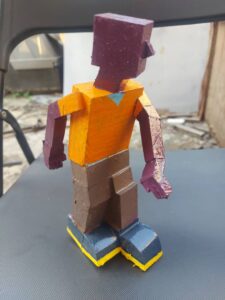
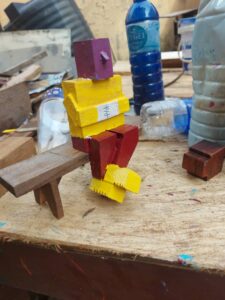
Abdulrazaq Awofeso, Waiting, 2020 (details)
Visual artist Abdulrazaq enjoyed the abundant time he had to experiment, research and “…finally being able to work on new items and materials which I have longed for. In the lockdown working was actually a solace for me. I could now work on developing ideas on the materiality and context of furniture. I made some fruitful discoveries. The new aspect about it was that I could now incorporate my art and furniture. I looked at the work of Gerrit Rietveld whose furniture and architecture I discovered and admired in Amsterdam during my stay at the Thami Mnyele residency. This inspiration I now could fully use”.
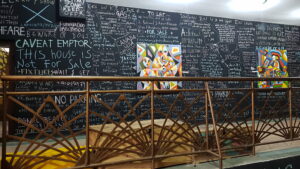
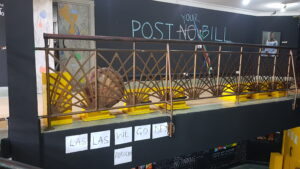
Revolving Art Incubator, Extroversion Projects I, Blackwall Experiment. 2019
Jumoke Sanwo is founder of Revolving Art Incubator, a cultural producer and artist. She prefers to simultaneously work on different projects that actually all interconnect. Some started pre-Covid, others responded to the challenges of this period. With RAI she continued to support artists and (re)present them, like David Akinola at FNB Art Joburg. She is part of the continental project and podcast series Archives of Forgetfulness, and collaborates with Adeola Olagunju on Adeola’s project Flâneuse, a female artist perspective on urban planning. She has been installing the residency program Kobomoje AiR, to be opened in 2021. Her own artistic work, the VR-essay Lagos at Large, travelled across festivals, regardless the pandemic.
Alternative infrastructures
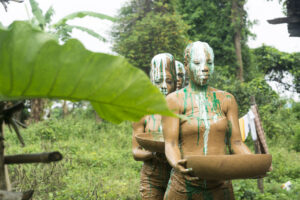
Akudaaya, a performance by Yusuf Durodola with the participants of Communal Re-Imagination, an Alternative Art School-programme in Iwaya Community. Photo by VAL Workstation,-2018
Do these activities reflect the city’s energy? “This ‘make do, can do’ spirit, resilience and the immense creativity is born out of lack of resources”, Oyinda explains, “it is what differs this city from cities where ‘everything works’. Lagos is the quintessential entrepreneurial African city, with its international connections, a diverse culture and so much simultaneously happening. Art season 2019 was pivotal, a lot of international visitors realized that something exciting was going on. Further professionalization of the sector would mean artists connecting with arts administrators and managers, that would allow them to focus on creating art, with Nigeria becoming a globally acknowledged standard”.
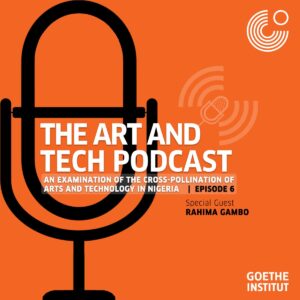
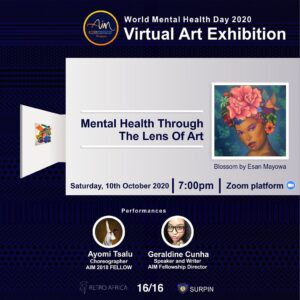
Oyinda Fakeye, The Art and Tech podcast, 2020/Arts and Medicine, online exhibition
But how to accommodate the rapid growth in terms of education? Mostly supplementary opportunities are created by private initiatives like CCA, AAF, or initial extra-curricular workshops at universities by independent art professionals. In terms of accommodating exhibitions: when I visited The Revolving Art Incubator to see Ayo Akinwande’s intense Power Show II in 2018 and the Extroversion project in 2019, the art space was located in a shopping mall. Exemplary solution, due to lack of governmental refusal to create space for art and culture. This is probably also why I saw the beautiful Art House overview of the Zaria Art Society with iconic artists like Bruce Onobrakpeya, in a Kia Motor showroom. Or why Lagos Biennial 2019 had to pay state government for each floor, for installing the exhibitions in the long abandoned Independence Building. Still, these alternative spaces seem creative solutions, to be preferred over state regulated white cube dominance?
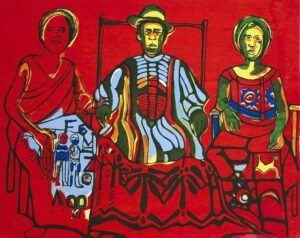
Bruce Onobrakpeya, Man and Two Wives, II, 1960-1970. © the artist
Jumoke points direction towards local solutions. She therefore engaged politically in governmental initiated committees to research how Lagos could be locally reinforced and internationally less dependent. “What we suggested to the government is the establishment of artistic hubs, across local government areas which could activate the artists within those areas. This could create engagement beyond the island where most of the art activities take place, expanding the art ecosystem to the mainland, where most of the people live. We also have to think how to connect artists in other parts of the country. The most important is a shift in thinking, so artists can begin to see local possibilities, monetizing their art at the local market and adding value to the creative industry. We should look for intersections from where this money can then transition into the artistic community, being self-sustaining without relying on international funding”.
#EndSARS might have a positive influence on local and national connectivity. “I felt inspired”, explains Oyinda, “because artists were responding to something that was happening real time and it was the collective experience, trauma, we were going through in that protest period. What I believe is that something broke within the artists here and they realized they have a voice, they have power and that they needed to be at the frontline as well”. Abdulrazaq explains the changed motivation for activism: “The protests were initiated by the younger generation and normally in Nigerian culture, you do not question an elder, we have been raised to accept everything from the older generation, whether you’re happy or not. Although it is not in our culture, we decided to break out, older and new generation”.
Future memories: 2021 forward
The current situation is worrying in many aspects, but all are optimistic. Abdulrazaq sees no other alternative than to keep on working, regardless the situation one finds himself as an artist. “I believe artists thrive creatively in a not so comfort position”. Jumoke: “I feel quite confident about the future; it is rooted in my present. I am engaging more with thoughts of the circularity of time in Yoruba cosmology. I found space to create value, and through my practice and production to better understand my local context within the global artistic and cultural milieu”. Oyinda is looking forward to shift her research to the Global South. “This is the influence of Bisi and my training at CCA, where we focussed more on conversations across the Global South. My plan for 2021 locally, is around building capacity for new media arts leveraging the digital”.
Aderemi concludes: “at Vernacular Art-space Laboratory, we believe art is important in shifting peoples’ minds from depression and crime. We equally believe that this is no time to entertain illustrative arts that might contribute nothing to the present realities of individual experiences. We are convinced that the arts created in a moment of disenfranchisement, are by those that care for humanity. One thing I strongly would like to change about the future of cultural workers is the financial situation across the globe. We cannot continue to gamble our financial income on projects and unreasonable artist fees”.
Just before publication of this article, Oyinda is appointed as Creative Director of CCA. The legacy of Bisi Silva continues, but now it is due to these determined professionals and their colleagues that the art scene of Lagos is expected to continue flourishing.
